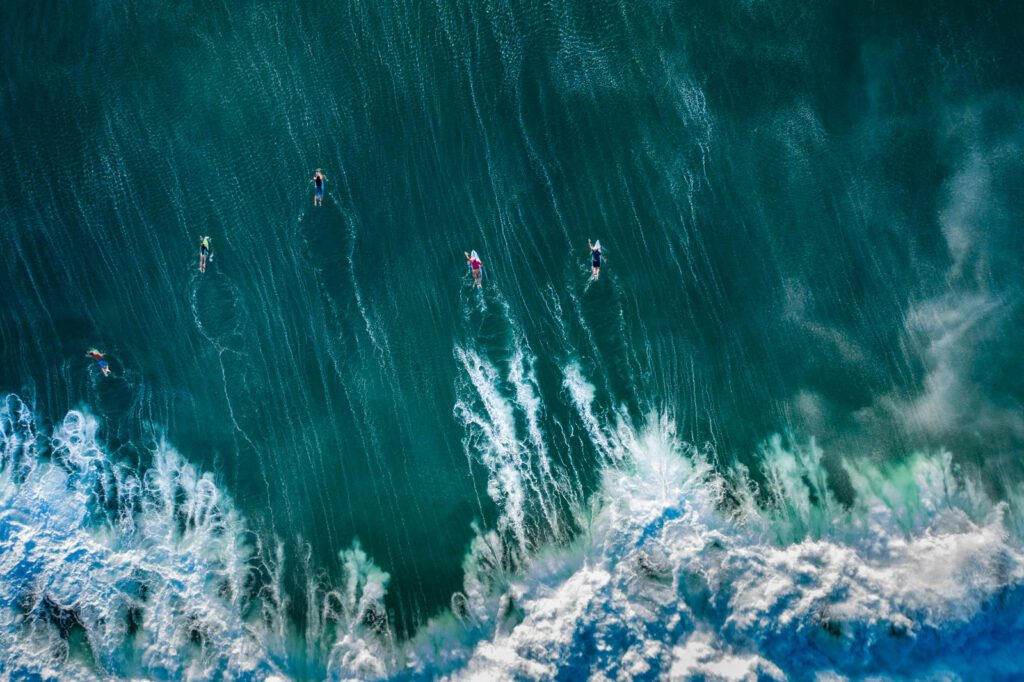Author
Obviously, there are some important qualifications and work experiences that need to be completed to put you on the path to your training contract and success in a legal career. However, I believe that there are activities outside of the traditional study and work experience that can also provide you with important tools to use when meeting challenges on the training contract. Learning how to surf provided me with an excellent mental training ground for the training contract. Here’s how:
Don’t give up (but know when to ask for help!)
Learning how to surf is punishing work. Waves are scary. The only way to learn that you’re not doing to die when you get dumped on by a wave, is by getting dumped on by many, many waves, and not dying.
Surf fitness is unique. Whilst being generally fit is helpful, the muscle groups you use can only really be built up by paddling a surfboard. Effort vs fun is therefore significantly unbalanced towards effort at the beginning. You have to put the time in the water to get stronger, and get out of your comfort zone to learn how to read and respond to waves and weather.
As you continue to put the work in, the scale slowly shifts towards a more rewarding activity, and whilst that happens your perspective on what scares you and what you can handle shifts.
Learning that I was capable of enjoying something that a year ago I would have been petrified of, is something I think that has mentally transformed how I approach my experiences in the training contract. I now understand that I have a completely unknown level of potential in most areas. It’s helped me see how things that seem impossible or intimidating are likely to seem so because I don’t have the experience. This simple shift in my perspective has allowed me to enjoy a more positive attitude towards some of the more challenging bits of work have come up in the training contract. I have a much stronger sense of faith that I can crack anything if I just put the work in, and I believe that part of that confidence has come from confronting fear and challenge regularly outside of work.
That being said, just as I’ve had to rely on friends and multiple surf instructors to give me a pep talk when I was panicking about heading out on a big day, or when I couldn’t figure out why I kept nose diving, it’s also hugely important to identify when you may need a bit of support to progress. Learning about your own limits at work is equally important – in surfing it will keep you safe, but at work this awareness will help prevent burn out, and most likely help you to progress and continue your development on the training contract more sustainably.
Don’t take yourself too seriously
Unfortunately, as I realised all too late, one doesn’t immediately transform into Kate Bosworth in Blue Crush the moment you pick up a surfboard. Despite years of work, I still look relatively inelegant when surfing, and my wipeouts are ridiculous. Comparing myself to others and being worried about looking silly just ended up getting in the way of me actually developing. Surfing really taught me the importance of focusing on my own development and experience. It taught me how to resist getting distracted by other people’s performance and comparing it to my own, and to not spend too much time worrying about how I was being perceived. As someone once told me in the water – no one is thinking about you as much as you are thinking about you. Our brains are hardwired to think more negatively rather than positively – aka “You can’t survive this wave – don’t even try it!” On a primal level, this way of thinking keeps safe, but in the modern world can get in the way of constructive development.
The training contract is often referred to as two-year job interview. In this kind of role, it’s easy to compare yourself to others on the scheme and paint yourself in a negative light, or to overthink small events, for example getting something wrong. Surfing has helped me notice when I am choosing to focus on a negative, rather than the reality in front of me, and given me the tools to rationalise my negative thinking.
One way of doing this is to strip down what I’m worrying about to what I factually know, and what I actually have control over. If another trainee seems more relaxed and as though they’re finding more success on the training contract than me – I know that this is my perception, and not necessarily reality. If I’ve done something wrong on a piece of work, I don’t know or have control over what the supervisor thinks about me and this mistake, but I do have control over what I do with the feedback moving forward.
It also helps to notice when I’m catastrophising. If the training contract is a two-year job interview, then realistically my legal career won’t end because I got something wrong on a piece of work. More likely, it will be measured on my overall performance.
Learning how to rationalise negative thoughts when surfing, has been instrumental to my enjoyment of the training contract. If you’re struggling to rationalise something, share the experience with a supervisor or a fellow trainee, and get their opinion on the situation. The likelihood is, no one is overanalysing your behaviour as much as you are.
Learn to fail!
Surfing teaches you very quickly how the days you fail, or don’t perform as well, are the essential building blocks to creating more of those magic moments. Every single time I’ve been in the wrong position on my board when trying to pop up, I’ve likely had a spectacular fall, been whirled around a little and had salt water flushed into my brain, but I am one step closer to getting it right, by understanding how I got it wrong.
Surfing teaches you to resist thinking in binaries. There’s no real success or failure, it’s an endless personal practice. Every single time you chose to get in the water you will learn something. I’ve learnt to celebrate any small improvements, because the big ones are too far and few between. Celebrating when I paddled out to a spot I was nervous about, even if I didn’t catch any waves. Celebrating when I decided to play in the white water because I wasn’t feeling the paddle out back. Celebrating my first cut back even if I fell off immediately after. Every mistake has value, and even small progress is progress.
This has been one of the most helpful mental tools during the training contract. Making mistakes in the water has helped me to accept mistakes in other parts of my life, as long as I can learn from them. This mindset has helped me approach challenges and opportunities in my training contract with curiosity rather than fear of failure. I’m less likely to see things in a binary way, a success or failure, and am more able to focus on where I need to improve rather than obsess about my performance in general.
Control your reactions!
An important part of surfing is engaging in the endless practice of understanding and controlling your reactions to fear and discomfort. If you panic when you’re clawing your way up a wave but know you’re about to be pulled over the lip, then you’re likely to be short of breath underwater and have a particularly bad time down there. If you accept what is about to happen, go limp and try to relax your body as you get swirled around underwater, you will conserve oxygen and be able to make more rational decisions about how to get out of the situation once you surface.
Surfing has given me more opportunities to confront my fight or flight response than any other activities I’ve tried.
This endless confrontation of my amygdala fuelled reactions, and experience trying to control them has been incredibly helpful during my training contract. Being more familiar with my reactions to stressful situations has helped me to identify I’m entering into a fight-or-flight mode at work, and has given me the experience to help manage those reactions. For example, taking a few deep breaths, focusing first on relaxing, and then replying to that email/organising my to do list/searching for that lost file.
Always have enough fuel in the tank to get home
It’s all very well and good having an amazing session and going for every wave you can. But you don’t want to be sitting out back completely exhausted as the light is starting to fade and you need to paddle back to shore. And then a set wave turns up.
The same goes for work. A trainee with enthusiasm and a can-do attitude is great – but not if that leads you to taking on more work than you can manage. You are responsible for managing your workload as a trainee, and that means managing your stamina and keeping an eye on your energy levels.
Manage your own workload by noticing when it’s effecting the turnaround time of work, or the quality of the work you’re producing. When this happens be honest with your supervisor and seek help on how to best tackle your situation and get your head back above water.
Of course, these insights are not restricted to surfing. Anything that gets you out of your comfort zone is likely to help prepare you for challenges in other parts of your life and is always worth a try!

